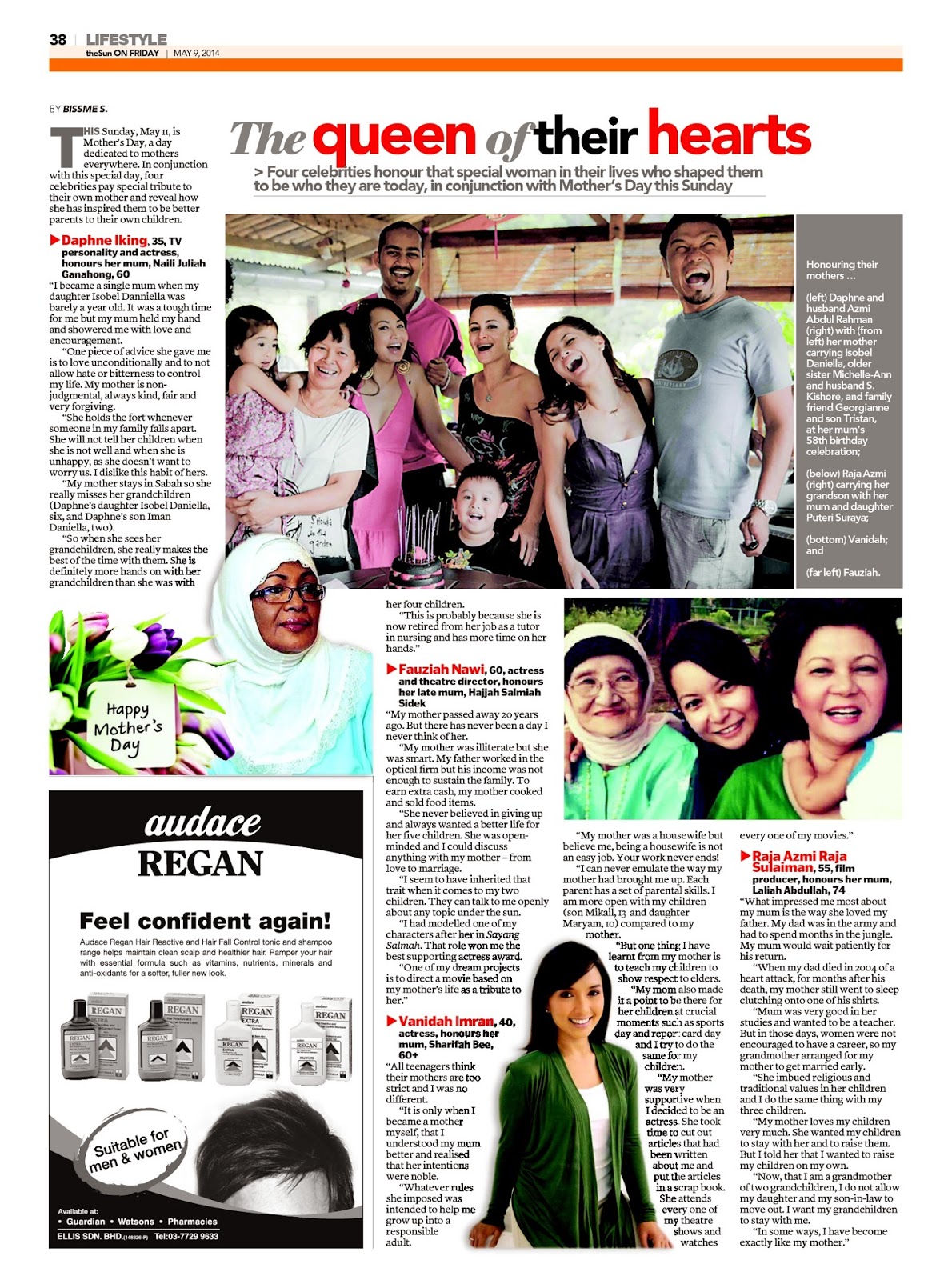I interview a documentary maker who made a film on child prostitution in Malaysia . The story appeared in theSun newspaper on May 20
Headline : Agent For Change
By Bissme s
MAHI Ramakrishnan worked as a journalist for 18 years before venturing into making documentaries in recent years.She has worked with media organisations such as the prestigious American weekly Time magazine and international news network Al Jazeera, and is currently a freelance foreign correspondent for USA Today, a daily that has a readership of more than three million.
She also freelances for Arise News Network, a 24-hour international TV news network with stations in London and New York.Recently, Mahi held a private screening of her latest completed documentary (her sixth), this time on the issue of child prostitution in Malaysia, to a selected group of Malaysians who then participated in an interesting discussion after the screening.
The 45-year-old Perak-born filmmaker spent more than two years working on the 30-minute documentary, Trapped: The Underage Sex Trade in Malaysia. She had previously tackled such sensitive issues as baby trafficking.
"Sometimes, I feel that change is not taking place," Mahi laments. "Those who watched my documentary were animated and had intense discussions after the screening. Then they went home and forgot about the issue.
"Whenever I tell people that child prostitution exists in Malaysia, they refuse to believe me. But when they watched my film, they were stunned. Child prostitution is more subtle over here."
She adds that it took her over two years to get the story as it is not easy to get people to talk about a sensitive subject like child prostitution.
"I met with pimps. But they refused to help," she says. "Instead, they tried to convince me that child prostitution does not exist here."
But Mahi did not give up. Finally, her persistence paid off when a pimp introduced her to three underage female sex workers.
The first girl came from a poor family in India. The girl's mother was told that her child could earn good money working as a maid in Malaysia.
"The moment she landed in Malaysia, they made her work as a child prostitute. She was only 13 then. When I met her, she was 15.
"I recall asking her why she was willing to talk to me and she said she had hoped that I would be able to rescue her."
Although Mahi attempted to save the girl, it was not to be as the girl disappeared soon after that. "The girl was my daughter's age and I felt so devastated that I could not help her."
The other two underage prostitutes she interviewed were from Indonesia and Thailand. Both were 16 and came over to work as sex workers on their own accord.
In the documentary, the Thai girl claimed she didn't have any difficulty getting across the border.
Mahi suggests that our Immigration Department look into that girl's claims.
"We should not take this matter lightly as we are talking about child sex here and child sex is illegal. It is the duty of every country to provide a safe environment for every child."
Why did the pimp allow Mahi to interview these underage prostitutes?
"I asked myself the same question. I'm still wondering about the answer," she says. "I was only given 10 minutes to talk to each girl. Maybe, the pimp knew he was safe and business would go on as usual."
Mahi wants her film to bring public awareness on the tragedy of child prostitution.
"I want society to organise itself and lobby for changes, without waiting for lawmakers to initiate such campaigns.
"As a documentary filmmaker, I want my movies to help bring change to society and for the better."
In the meantime, Mahi is just wrapping up her latest documentary – Seeds of Hatred – on the persecution of the Muslim Rohingya community and the discrimination faced by the people in Myanmar.
She made several trips to Myanmar last year to shoot the documentary.
"I hope my documentary will enable the people in Myanmar to understand that everyone had suffered tremendously during the military rule," she says.
"I hope they can reach out to one another. I hope they will become a stronger force and their voices will be heard."
When asked what she thought about opposition leader Aung San Suu Kyi's response to the plight of the Rohingya, Mahi did not mince her words.
"I used to be a big fan of her," she says. "I thought she would be great for Myanmar.
"I had expected her to speak up about the persecution of the Rohingya. These people were being murdered and burned alive.
"But she said nothing. She has turned out to be a huge disappointment."
Mahi hopes to screen Seeds of Hatred in Myanmar sometime later this year.
PS: Below are the pictures from her latest documentary Seeds of Hatred
 |
| Mahi went to Mymanmar several times to shoot her documentary Seeds of Hatred |
 |
| Mahi hopes to show Seeds of Hatred in Mymanmar end of the year |
 |
| Seeds of Hatred is documentary that touches on the political landscape of Mymanmar |
 |
| Another interesting scene from the documentary Seeds of Hatred |








+with+her+daughter+Puteri+Suraya+and+Her+mom+Laliah+Abdullah.png)

